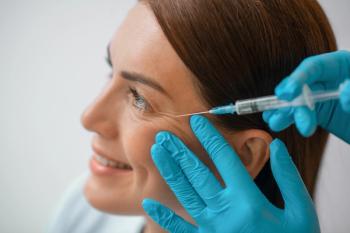
- Innovative Perspectives: Aesthetic Authority Vol. 2: No. 3
- Volume 2
- Issue 3
Marine Collagen—Safe and Effective for Skin Rejuvenation?
A new study examines the effects of hydrolyzed marine collagen on women’s faces.
Results of a study (NCT04449159) investigating the safety and efficacy of a hydrolyzed marine collagen on skin elasticity, wrinkles, and hydration over 12 weeks were recently published in the
The randomized, triple-blind, placebo-controlled, parallel study included women aged 45 to 60 years with a BMI of 20.0-29.9 kg/m2 who displayed visible signs of natural and photoaging to the face. Aging was assessed by the Fitzpatrick questionnaire, and all patients agreed to avoid prolonged exposure to ultraviolet radiation for study duration.
Vinh Wellness collagen (VWC) is derived from pangasius hypothalamus, a sustainable tropical freshwater fish. The patients took 10 g of VWC or placebo powder dissolved in at least 100 mL of water every morning on an empty stomach for 12 weeks.
If the dose was forgotten, participants were told to immediately consume the dose and not to exceed 10 g.
The study examined the change in wrinkles, elasticity, and self-reported skin appearance after 12 weeks of treatment. Data were collected at week 0, week 6, and week 12. Additionally, safety data were collected at every visit and evaluated at week 12.
A skin wrinkle analysis was captured using the sixth-generation VISIA Skin Analysis System (Canfield Scientific) to assesses the number of visible wrinkles. Skin elasticity was measured using a Cutometer Dual MPA 580 (Courage+Khazaka electronic GmbH). Measurements were taken at baseline, week 6, and week 12.
Self-assessed skin quality data were gathered using a Visual Analogue Scale (VAS), which ranks patients’ responses from 0 (no improvement) to 100 (great improvement). Patients were asked to report their skin health based on skin elasticity, hydration, radiance, firmness, wrinkles, and overall feel.
Fifty patients were enrolled in the study, with 25 randomized into the placebo group and 25 into the VWC group. In total, 45 patients finished the study and 5 patients withdrew consent.
At baseline, patients in the VWC group reported lower VAS scores vs placebo. However, by week 12, the VWC group reported higher scores when compared with placebo in all VAS categories. The VISIA measurements were reduced by 24% in wrinkle score after 12 weeks in patients treated with VWC.
There was no significant difference in cheek skin elasticity between VWC and placebo after 12 weeks, according to the study. The VWC group achieved an 11% improvement in cheek elasticity from baseline to week 6 and a 6% decrease in elasticity from weeks 6 to 12. The placebo group achieved a 5% improvement from baseline to week 6 and a 3% improvement from week 6 to week 12. Of note, patients aged between 45 and 54 years who received VWC treatment achieved a 20% to 10% improvement from baseline to week 6 and then to week 12.
There were 32 adverse effects (AEs) reported among 19 patients. Out of the 32, 18 were reported by patients in the VWC group compared with 14 in placebo. Out of 18 AEs, 17 were categorized as not related/not likely related to the treatment. The 1 AE of mild nausea was reported as possibly being related to the product. All AEs were resolved by the end of the study.
All hematology, clinical chemistry, electrolytes, and liver and kidney function markers remained within healthy clinical reference range during the study for both groups.
The improvements in skin health were consistent with previous studies examining collagen supplementation.2,3 This is the first study to look at the different responses between the left and the right side of the cheeks, according to the study authors. Photoaging and melanoma are typically more prevalent on the left side of the face due to sun exposure when driving and micropressure when sleeping, they wrote.4,5
“Future studies are needed to examine potential synergistic effects of VWC with other skin enhancing nutrients and the mechanism of action associated with collagen supplementation and improvements of skin health,” the authors wrote.
References:
1. Evans M, Lewis ED, Zakaria N, Pelipyagina T, Guthrie N. A randomized, triple-blind, placebo-controlled, parallel study to evaluate the efficacy of a freshwater marine collagen on skin wrinkles and elasticity. J Cosmet Dermatol. 2021;20(3):825-834. doi:10.1111/jocd.13676
2. Choi SY, Ko EJ, Lee YH, et al. Effects of collagen tripeptide supplement on skin properties: a prospective, randomized, controlled study. J Cosmet Laser Ther. 2014;16(3):132-137. doi:10.3109/14764172.2013.85411
3. Zhou SL, Wang HY, Yue DX. Clinical effects and safety of oral treatment with low-molecular fish collagen hydrolysate on female facial skin properties. J Pract Dermatol. 2011;4(3). https://en.cnki.com.cn/Article_en/CJFDTotal-SYPF201103008.htm
Articles in this issue
over 4 years ago
Innovative Perspectives: Aesthetic Authority Vol. 2: No. 3over 4 years ago
There’s Nothing New About This “New Normal”over 4 years ago
Botulinum Toxin A Effective in Upper Lip Enhancementover 4 years ago
Expert Advice: Don’t Shrug Off Postpartum Hair Lossover 4 years ago
Adipose-Derived Stem Cells for Wound Healingover 4 years ago
Rare Cryolipolysis Complicationsover 4 years ago
Single-Plane vs Double-Plane MFU-V for Upper Arm Skin Laxityover 4 years ago
Is NPS effective for facial treatment?Newsletter
Like what you’re reading? Subscribe to Dermatology Times for weekly updates on therapies, innovations, and real-world practice tips.











